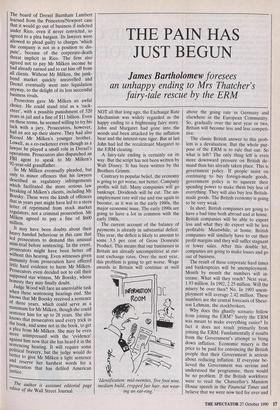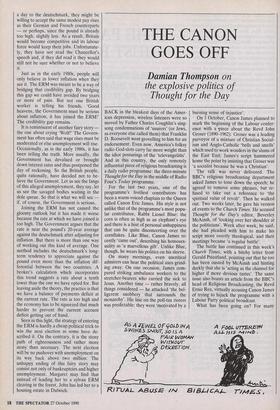THE PAIN HAS JUST BEGUN
James Bartholomew foresees an unhappy ending to Mrs Thatcher's fairy-tale rescue by the ERM
NOT all that long ago, the Exchange Rate Mechanism was widely regarded as the happy ending to a frightening fairy story. John and Margaret had gone into the woods and been attacked by the inflation bear and the interest-rate tiger. But at last John had led the recalcitrant Margaret to the ERM clearing.
A fairy-tale ending is certainly on its way. But the script has not been written by Walt Disney. It has been written by the Brothers Grimm.
Contrary to popular belief, the economy is going to get worse, not better. Company profits will fall. Many companies will go bankrupt. Dividends will be cut. The un- employment rate will rise and rise again to become, as it was in the early 1980s, the major economic issue. The early 1990s are going to have a lot in common with the early 1980s.
The current account of the balance of payments is already in substantial deficit. This year, the deficit is likely to amount to some 3.5 per cent of Gross Domestic Product. This means that our businesses in Britain are already uncompetitive at cur- rent exchange rates. Over the next year, this problem is going to get worse. Wage awards in Britain will continue at well
`Identification: mid-twenties, five foot nine, medium build, cropped fair hair, not wear- ing an ear-ring.'
above the going rate in Germany and elsewhere in the European Community. So, gradually over the next year or two, Britain will become less and less competi- tive.
The classic British answer to this prob- lem is a devaluation. But the whole pur- pose of the ERM is to rule that out. So what is left? The only thing left is even more downward pressure on British de- mand than has already taken place. This is government policy. If people insist on continuing to buy foreign-made goods, government policy is to squeeze their spending power to make them buy less of everything. They will also buy less British- made goods. The British economy is going to be very weak.
In short, British companies are going to have a bad time both abroad and at home. British companies will be able to export less and what they do export will be less profitable. Meanwhile, at home, British companies will similarly have to cut their profit margins and they will suffer stagnant or lower sales. After this double hit, companies are going to make losses and go out of business.
The result of these corporate hard times and bankruptcies will be unemployment. Month by month the numbers will in- crease. What will they reach? Next year, 1.93 million. In 1992, 2.25 million. Will the misery be over then? No. In 1993 unem- ployment will average 2.42 million. These numbers are the central forecasts of Shear- son Lehman, the stockbrokers.
Why does this ghastly scenario follow from joining the ERM? Surely the ERM was meant to make everything easier? In fact it does not result primarily from joining the ERM. Fundamentally it results from the Government's attempt to bring down inflation. Economic misery is the price to be paid for convincing the British people that their Government is serious about reducing inflation. If everyone be- lieved the Government was serious and understood the programme, there would be no problem. If the British workforce were to read the Chancellor's Mansion House speech in the Financial Times and believe that we were now tied for ever and
a day to the deutschmark, they might be willing to accept the same modest pay rises as their German and French counterparts — or perhaps, since the pound is already too high, slightly less. As a result, Britain would become competitive and its labour force would keep their jobs. Unfortunate- ly, they have not read the Chancellor's speech and, if they did read it they would still not be sure whether or not to believe it.
Just as in the early 1980s, people will only believe in lower inflation when they see it The ERM was meant to be a way of bridging that credibility gap. By bridging this gap we could have avoided two years or more of pain. But not one British worker is telling his friends, 'Good heavens, the Government must be serious about inflation, it has joined the ERM!' The credibility gap remains.
It is reminiscent of another fairy story the one about crying 'Wolf!' The Govern- ment has often said that wage rises must be moderated or else unemployment will rise. Occasionally, as in the early 1980s, it has been telling the truth. More usually, the Government has devalued or brought down interest rates and thus postponed the day of reckoning. So the British people, quite rationally, have decided not to be- lieve the Government. Let us see the fangs of this alleged unemployment, they say, let us see the savaged bodies waiting in the dole queue. So that is what we will see if, of course, the Government is serious.
Joining the ERM has not caused the gloomy outlook but it has made it worse because the rate at which we have joined is too high. The Government argues that the rate is near the pound's 20-year average against the deutschmark after adjusting for. inflation. But there is more than one way of working out this kind of average. One method includes the deutschmark's long- term tendency to appreciate against the pound even more than the inflation dif- ferential between the two countries. A broker's calculation which incorporates this trend suggests a rate about a tenth lower than the one we have opted for. But leaving aside the theory, the practice is that we have a balance of payments deficit at the current rate. The rate is too high and the economy has to be squeezed that much harder to prevent the current account deficit getting out of hand.
Seen in this light, the strategy of entering the ERM is hardly a cheap political trick to win the next election as some have de- scribed it. On the contrary, it is the stony path of righteousness and rather more stony than necessary. The next election will be no pushover with unemployment on its way back above two million. The unhappy ending of this fairy story may consist not only of bankruptcies and higher unemployment. Margaret may find that instead of leading her to a sylvan ERM clearing in the forest, John has led her to a housing estate in Dulwich.



































































 Previous page
Previous page